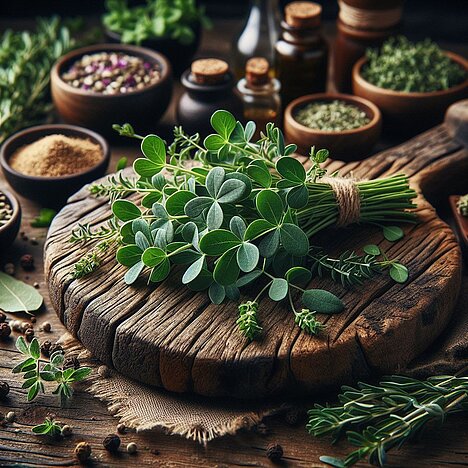Snail clover

Snail clover is a genus of plants in the legume family, which comprises around 87 species. The name comes from the shape of the legumes, which can curl up like snails. Snail clover grows mainly in the Mediterranean region and is used as a fodder plant or green manure.
But what does snail clover have to do with dogs? Is it poisonous or healthy for them? What are its advantages and disadvantages? In this article, you can find out more about this plant and how it can affect your dog.
Is snail clover poisonous to dogs?
The good news is that snail clover itself is not poisonous to dogs. It contains no dangerous ingredients and can be eaten by them without any problems. However, you should make sure that your dog doesn't eat too much of it because, as with any plant, it can cause digestive problems if he ingests too much.
The bad news is that slug clover can be confused with slug pellets. Slug pellets are used to control slugs and snails in the garden, but they are very toxic to dogs. If your dog accidentally eats slug pellets, it can cause severe symptoms of poisoning, such as vomiting, tremors or convulsions. Therefore, you should always make sure that your dog does not eat slug pellets and preferably not use them in your garden at all.
What are the benefits of snail clover for dogs?
Snail clover has several benefits for dogs. Firstly, it is a good source of fiber and protein, which are important for digestion and the immune system. Secondly, it also contains many vitamins and minerals that can help your dog stay healthy and fit.
Snail clover also has a positive effect on the soil. It binds nitrogen from the air and releases it into the soil. This promotes the growth of other plants and improves soil quality. This also benefits your dog, as he can play and sniff around in a natural and species-rich environment.
What are the disadvantages of snail clover for dogs?
Snail clover also has some disadvantages for dogs. For one thing, it can trigger allergic reactions in dogs that are sensitive to pollen or other plant components. This manifests itself, for example, in sneezing, itching or a skin rash. If you notice that your dog shows such symptoms after coming into contact with snail clover, you should have him examined by a vet.
On the other hand, snail clover can also have undesirable side effects in dogs with certain illnesses or taking medication. For example, it can lower blood sugar levels in diabetics or affect blood clotting in haemophiliacs or anticoagulant users. If your dog suffers from such illnesses or is taking medication, you should speak to your vet before giving him snail clover.
Feeding snail clover to dogs
If you want to feed your dog snail clover, there are a few things you should bear in mind. Firstly, you should only use fresh or dried snail clover and wash or rub it well to remove any harmful substances. Secondly, you should only give small amounts and mix them with the normal food to avoid overdosing.
Snail clover can be used as a supplementary food to make your dog's diet more varied and healthy. It can be combined with fruit, vegetables or herbs, for example. You can also try different types of snail clover, such as hop snail clover, which is particularly aromatic.
But be careful: snail clover does not replace your dog's main food. It should only ever be given as a supplement and should not make up more than 10% of the daily food ration. In addition, you should always pay attention to your dog's reaction and stop giving him snail clover immediately in the event of intolerances or side effects.
Snail clover is a plant with many advantages and disadvantages for dogs. It is not poisonous to them, but it can be confused with slug pellets, which are very dangerous. It has many health benefits for them, but it can also cause allergic reactions or drug interactions. It can be given as a supplementary food, but it should only ever be given in small amounts and in combination with the normal food.
If you notice any signs of hypersensitivity or poisoning in your dog, you should see your vet immediately. We are not a substitute for a vet, but we try to be as accurate as possible. Every dog reacts differently and we recommend you get a second opinion or consult your vet if in doubt.
Stay healthy and take good care of your four-legged friend!😊